|
| |||
 |
Atlas F1 Exclusive Max Mosley: Face to Face | ||
| by Thomas O'Keefe, U.S.A. | |||
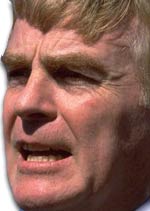 In the build-up to the European Commission's final decision regarding the antitrust case against F1, FIA president Max Mosley talks exclusively to Atlas F1 about the anticipated settlement and other subjects of current interest. In a four-part series of features, Thomas O'Keefe outlines Mosley's path through the ranks, his childhood in a controversial home, the EC v. F1 case, Bernie Ecclestone, women in racing, and untimately, yes, his views about going back to Slicks In the build-up to the European Commission's final decision regarding the antitrust case against F1, FIA president Max Mosley talks exclusively to Atlas F1 about the anticipated settlement and other subjects of current interest. In a four-part series of features, Thomas O'Keefe outlines Mosley's path through the ranks, his childhood in a controversial home, the EC v. F1 case, Bernie Ecclestone, women in racing, and untimately, yes, his views about going back to Slicks
Part III - The Hearing Before the EC as to the Future of F1:
Is There Going to be a Settlement on the Courthouse Steps?
After years of bumping along through the European Commission bureaucracy, the Commission's Directorate General for Competition issued a so-called "Warning Letter" in December 1997 to the FIA, FOA an the ISC, following that Letter up with a formal Statement of Objections dated June 28, 1999. The FIA and the other respondents filed their vigorous Response to the Statement of Objections on January 31, 2000.
All parties having briefed the matter, an oral hearing was scheduled by the European Commission in Brussels on May 10-12, 2000 to finally bring the matter to a decision. The purpose of the hearing was to determine whether the European Commission itself would adopt its own the findings of antitrust violations.
Prior to the hearing, all parties went on a war footing. AE TV had prepared its own 90-minute presentation in support of its complaint. RTL, the German TV network which broadcasts extensive Formula One coverage and which has contracts with FOA that were at risk, was invited to attend. And the FIA began a press offensive, calling for the May hearing to be open to the public and the press and taking the unusual step of publishing all the core written submissions on its website, thus exposing to public view the kind of documents the Commission typically treats as confidential.
By letter of 2 May 2000 Mr. Monti responded to Mr. Mosley. He indicated that, upon a first reading, Mr. Mosley's proposals appear to be innovative and constructive, and that his services would be happy to discuss the settlement proposals in more detail. However, in view of the ongoing preparations for the Oral Hearing in these cases which the Commission, at the request of the parties concerned, intended to hold on 10, 11 and 12 May, Mr. Monti informed Mr. Mosley that the discussions could only begin after those dates.
Following that letter, the three parties to the case, FIA, Formula One Administration Ltd. (FOA) and International Sportsworld Communicators (ISC), have requested that the Commission postpone the oral Hearing, which the Commission has agreed to do. The Commissioner instructed his services to begin the settlement discussions with FIA immediately."
Uncharacteristically, the FIA's statement was even shorter than the Commission's: "The FIA has nothing to add to this statement."
So what is really going on behind the scenes and is the postponement of the hearing and the pursuit of settlement a victory for the FIA or a reflection of the fact that the FIA, FOA and the ISC are desperate to get out of this case and are prepared to make certain concessions to make the matter go away?
But by May 9th, apparently AE TV began to develop a jaundiced view of the settlement and AE TV sent its own aggressively phrased letter to Professor Monti, that was a pointed shot across the Commission's bow, warning the Commission not to regard AE TV as a mere observer in this matter but a party whose participation and consent would be needed to effectuate a binding and final settlement. The AE TV letter reads:
* * *
"AE TV trusts that the Commission will not consider any settlement which does not meet these requirements which are essential for restoring competition and putting an end to the unlawful situation whereby a regulatory monopoly is used to serve the financial interest of the FIA and its senior management.
* * *
"Please note that any settlement which does not meet these minimum requirements will be challenged by AE TV before the Court of First Instance of the European Communities. In fact, it would be disastrous if the public's perception was that all that is needed to obtain a 'soft compromise' from the Commission in a case involving very serious infringements of the competition rules is to pressurize the Commission as a whole and individual Commissioners (in an article of 27 September 1999 in the German magazine Focus, Mr. Van Miert is quoted as saying that "in the Formula One case, people were spending a lot of money to destroy me"), to accuse your services of "behaving grossly improperly and displaying incompetence amounting to abuse", and to ask for "replacing the officials dealing with the FIA's case" (FIA's public letter to you of 1 February 2000).
"It is clear that, on substance, the FIA's defense is helpless and, in its key parts, based on clearly incorrect statements (for details, see the Annex), which explains the FIA's interest in avoiding an oral hearing and settling the case.
Translation: we here at AE TV smell a rat and want to remind you that you should not think that if you settle this case without our consent that you have heard the last of us: we will see you in court in Luxembourg.
First, it is probably not a coincidence that just a month before the hearing, Bernie Ecclestone, through ISC, divested himself of the rights to exploit the TV broadcasting rights to the FIA World Rally Championship, one of the indications of monopoly that has been the subject of the Commission's proceedings. This divestment diminishes the appearance of Ecclestone's control over TV broadcasting rights. Ecclestone had previously withdrawn from the lesser FIA Championships in 1998.
The purchaser of ISC was Dave Richards, formerly Benetton's team manager who has been previously associated with rallying and who will now control the TV broadcasting rights for the FIA-sponsored World Rally Championship. It is clear from Max Mosley's February 1st 2000 letter to Professor Monti that the FIA and Ecclestone were advised through back channels at the European Commission that if Ecclestone gave up these World Rally TV rights, "this would make the 'problems' concerning Formula One less acute and much easier to deal with."
Second, the FIA have let it be known that certain provisions of the Concorde Agreement that are not enforced anyway could be sacrificed as the price of a settlement. For example, there is a clause in the Concorde Agreement that prevents the Formula One teams from competing in another series. The FIA has offered to delete that clause.
Coincidentally, on April 6th 2000, the FIA's World Motor Sport Council announced that the CART Indy-style car series and the American LeMans ("ALMS") world sports car series "have been sanctioned as FIA recognized International series." CART and ALMS are important as examples of cases where the FIA does not exercise a stranglehold over TV rights. The FIA states: "In the series which we authorize (i.e. license) but do not ourselves organize, we do not claim the [TV broadcasting] rights. We thus claim rights to only a very small proportion of motor sport championships. We do not claim rights in events like LeMans or Indianapolis which we authorize but are not part of any of our championships."
According to Mosley, since CART now wants to go to other flyaway circuits in the UK and maybe also in to Germany "it makes sense that they have an authorized series which facilitates things," assuming CART is running on a safe track and under safe conditions. Beyond that, the FIA does not get involved in TV rights because it is CART and not the FIA that organize the championship. Mosley emphasized that this step was simply the latest collaboration of CART with the FIA that goes back to FIA's original approval of Surfer's Paradise in Australia as a CART venue.
Third, the FIA have acknowledged in a statement in April 2000 that serious governance issues can be raised as to all sport, not just motorsport, "particularly the need to reconcile the power of sporting authorities and the hierarchical nature of sport with the need for commerce to operate freely," on which the FIA would welcome "input from other parts of the Commission as well as from national governments and sports federations. Dialogue and a search for solutions are needed."
Indeed, in Max Mosley's March 31st letter to Professor Monti, Mosley made the following statement: "We have repeatedly said that an open and rational dialogue could resolve the outstanding issues in an afternoon. All be need is neutral interlocutors with no agenda save to seek a solution consistent with EU competition law. This remains our position and our offer."
In our interview. Mosley gave us a preview of the kind of controls over corporate governance that the FIA might be open to:
But make no mistake about it, however comforting a Government of Laws may be to an outside supervisory body, Mosley leaves the impression that he personally believes in the Government of Men, old-fashioned as that may sound and be. Ecclestone too seems proud of his tradition of Keeping His Word, preferring a handshake on the pitlane to a multi-page contract with exhibits. Even in the formal European Commission documents it is stated that, "Mr. Ecclestone has always operated on an informal handshake basis."
As for the European Commission's flourishing of an olive branch, it is revealing that even though Professor Monti is new to the job, he is already out on the stump giving speeches. And in a speech he gave on April 17th in Brussels on "Sport and Competition," he seemed to be taking a page out of Max Mosley's copy book in his description of the approach now being followed by the Commission "in applying competition rules to sports-related economic activities: the first principle is to take account of the special characteristics of sport," a position that Bernie and Max have been trying to hammer away at for years.
A second principle is "to apply the competition rules in a manner which does not question the regulatory authority of the sporting organizations ... sporting rules applied in an objective, transparent and non-discriminatory manner do not constitute restrictions on competition."
Commissioner Monti's speech also addressed the importance of selling TV broadcasting rights, stressing, however, the dangers the Commission perceives when there is a concentration of rights, particularly "on an exclusive basis for a long duration, or covering a large number of events."
Fourth, Mosley's letters and the FIA's recent statements make it clear that if the case is not settled, it will enter an entirely different realm, a political realm, even reaching up to the level of the European Parliament, to which the Commission and its staff is ultimately accountable. Says Mosley:
And as part of its political battle, if it comes to that, the FIA promises to unmask in full for the Commission's overseers at the European Parliament to see the various acts of maladministration that have, according to the FIA, characterized the behavior of the Commission's staff in the handling of the case against Formula One. The Commission has already apologized for the leaking of a confidential letter to the financial press at an earlier point in the proceedings and has been required to pay 40,000 ECU's as costs to the FIA.
But the FIA is not satisfied that the Commission is willing or able to investigate itself and apparently there is more dirty linen to be aired, according to the FIA's recent submissions.
Mosley's letter to Professor Monti dated March 31 makes a tantalizing charge, to wit, that an official of the European Commission "intervened on behalf an outside business interest ... that your services passed commercially sensitive information about their plans to outside business interests before even the Director General (still less the FIA) had been informed."
Where the truth lies in this maladministration of justice allegation, it is clearly the kind of conduct that the relatively newly-minted Professor Monti would rather not like to spend his days defending to the European Parliament, particularly since most of the conduct under scrutiny did not happen on Monti's watch.
Although Mosley is prepared to meet with the Commission "in a friendly and constructive way" he has made it clear in his letters to Professor Monti that if the Commission does not want to do that then Mosley will "pull out all the stops" and that the FIA "will say things in the hearing and to the media which will make it difficult if not impossible to reach a settlement. In other words, I am really going to go for them [the Commission]."
Finally, is a settlement in the interest of Formula One fans, if it leaves in place the fundamental structure of the FIA controlling the licensing and organizing of the Formula One Championship as well as the right to appropriate to itself the TV broadcasting events and assign such rights to others like the FIA and ISC for marketing and commercial exploitation?
To begin with, from a Formula One fan's perspective, they don't have a car in this race; the European Commission proceeding is happening to them, not with them or for them. It is essentially a commercial dispute with one of the world's Governments, the European Union, over how to cut up the lucrative TV broadcasting pie for FIA-organized Championships and none of the likely outcomes are appetizing.
For their part, AE TV and the Commission believe the remedy is the traditional one in monopoly cases: to break up the FIA's monopoly over international motorsport and enable promoters, organizers, teams and drivers the freedom to participate in international series/events without having to fear sanctions being imposed by the FIA. And, as a crucial element of the remedy, the FIA would be forced to relinquish its claim to TV broadcasting rights and the demands it make upon promoters of FIA-organized events to cede their television rights to the FIA as the price of running a championship event under the FIA flag. Do you prefer the Devil you know to the Devil you don't?
|
||||
|
One thing seems certain: controlling TV rights to the Formula One Championship is the name of the game because the racing, the circuits and the TV coverage are now sufficiently homogenized that the races themselves could in truth be held anywhere and, increasingly, they are.
As Denys Rohan, the Chief Executive of Silverstone has said: "The Commission also seems to be forgetting that Formula One has become a global TV circus, in which it doesn't really matter - except to the circuits and those immediately dependent on an event - where it is held. There is no fundamental reason why all the Grands Prix could not be held outside the EU." -- A cold, cynical and uncaring view of Formula One perhaps, certainly not evocative of the days of Fangio, Moss and Clark, but a sobering, informed and realistic assessment nonetheless from someone in a position to know.
|
Face to Face with Max Mosley - Part I (May-24, 2000)
Face to Face with Max Mosley - Part II
Formula Bernie - Part III | |||
| Thomas O'Keefe | © 2000 Kaizar.Com, Incorporated. |
| Send comments to: okeefe@atlasf1.com | Terms & Conditions |
Credit for image used in the quotes of this article: Mark Thompson © Allsport | |
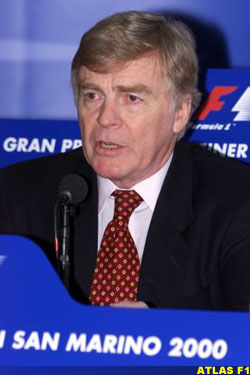
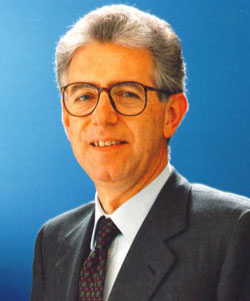 AE TV is trying to put a brave face on this turn of events and initially had this response on May 5th:
AE TV is trying to put a brave face on this turn of events and initially had this response on May 5th:
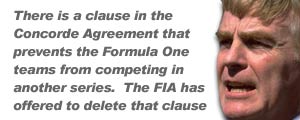 After years of bitter exchanges between the FIA and the Commission, what are the "innovative and constructive proposals" that Professor Monti found so appealing and which create the common ground for settlement? The answer is in the prior exchange between Max Mosley and Professor Monti and in external events that are plainly calculated to take the sting out of much of what the Commission has criticized in the way Formula One is run.
After years of bitter exchanges between the FIA and the Commission, what are the "innovative and constructive proposals" that Professor Monti found so appealing and which create the common ground for settlement? The answer is in the prior exchange between Max Mosley and Professor Monti and in external events that are plainly calculated to take the sting out of much of what the Commission has criticized in the way Formula One is run.
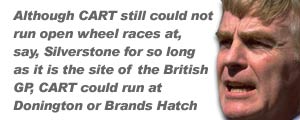 This means that although CART still could not run open wheel races at, say, Silverstone for so long as it is the site of the British Grand Prix, CART could run at Donington or Brands Hatch; indeed, according to Max, that restriction "would only apply to 9 circuits in the European Union out of 14 circuits that allow Formula One and a whole lot more that we would like for Indycars because they can also run on a grade 2 circuit, rightly or wrongly, but they can."
This means that although CART still could not run open wheel races at, say, Silverstone for so long as it is the site of the British Grand Prix, CART could run at Donington or Brands Hatch; indeed, according to Max, that restriction "would only apply to 9 circuits in the European Union out of 14 circuits that allow Formula One and a whole lot more that we would like for Indycars because they can also run on a grade 2 circuit, rightly or wrongly, but they can."
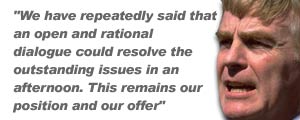 Reading between the lines, Mosley seems to be saying that although he and the other members of the Club know and trust each other and try to be honest and above board, he can understand how outsiders may see nothing but weak controls and informal procedures in an area of commerce that involves hundreds of millions of dollars, possibly not the most sensible way to do business but understandable if you know how it all developed.
Reading between the lines, Mosley seems to be saying that although he and the other members of the Club know and trust each other and try to be honest and above board, he can understand how outsiders may see nothing but weak controls and informal procedures in an area of commerce that involves hundreds of millions of dollars, possibly not the most sensible way to do business but understandable if you know how it all developed.
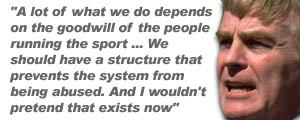 In short, although Professor Monti made these remarks at a conference on sport, he basically gave the FIA the playbook for what will and will not pass muster under his era as head of Competition Directorate.
In short, although Professor Monti made these remarks at a conference on sport, he basically gave the FIA the playbook for what will and will not pass muster under his era as head of Competition Directorate.
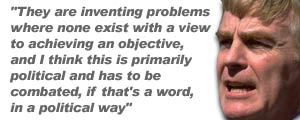 Professor Monti, in his March 24 letter to Mosley gives these charges short shrift and says Mosley is simply rehashing "false allegations against the Directorate General for Competition ... You also reiterate allegations concerning improper behavior by an individual official involved in these cases. As you know, there was an internal Commission investigation which did not reveal any wrong-doing."
Professor Monti, in his March 24 letter to Mosley gives these charges short shrift and says Mosley is simply rehashing "false allegations against the Directorate General for Competition ... You also reiterate allegations concerning improper behavior by an individual official involved in these cases. As you know, there was an internal Commission investigation which did not reveal any wrong-doing."
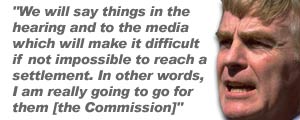 The FIA predicts an end to free coverage of Formula One on terrestrial television in the EU, a drastic reduction in the number of European Formula One races and a Balkanized consortium of multiple governing bodies, promoters and commercial TV production companies bidding to put on an international Championship that will be run in accordance with substandard safety conditions.
The FIA predicts an end to free coverage of Formula One on terrestrial television in the EU, a drastic reduction in the number of European Formula One races and a Balkanized consortium of multiple governing bodies, promoters and commercial TV production companies bidding to put on an international Championship that will be run in accordance with substandard safety conditions.